Related Research Articles
The K League Best XI is an award for the best eleven players in a K League season.

Noh Tae-won is a South Korean physicist and director of the Center for Correlated Electron Systems (CCES) in the Institute for Basic Science (IBS) at Seoul National University (SNU). He has published more 400 papers and been cited 15,000 times. He is a member of the Materials Research Society,Korean Optical Society,Korean Crystallographic Society,and Association of Asia Pacific Physical Societies and been on several editorial boards for journals. In 2017,he became president of the Korean Dielectrics Society.

Eunjoon Kim is a professor of KAIST and director of Center for Synaptic Brain Dysfunctions within the Institute for Basic Science (IBS). His current research focuses on molecular mechanisms underlying autism spectrum disorders and synaptic brain dysfunctions. With over 200 publications to his name,his research has been cited over 27,000 times giving him an h-index of 81. He graduated from Busan National University in 1986,received master's degree at KAIST in 1988,received PhD degree at Michigan State University in 1994,and worked at Harvard Medical School as a postdoctoral fellow during 1995-1996. His current research focuses on molecular organization of neuronal synapses and synapse dysfunction-related psychiatric disorders.
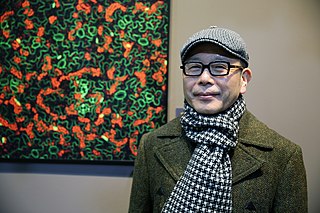
Hong Gil Nam is a South Korean biologist teaching in the Department of New Biology of Daegu Gyeongbuk Institute of Science and Technology and leading research as director of the Center for Plant Aging Research. His research interests include comparative aging in diverse kingdoms,including plant and animals,to reveal aging mechanisms among species,cross-kingdom interaction between plants and animals,and biochemistry at nano and micro levels. He is the founder and former director of the Biological Research Information Center,a member of the Korean Academy of Science and Technology,and has served on the editorial board in Molecular Plant since 2013.
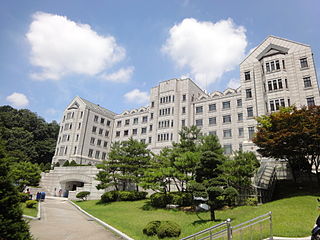
The R. K. Cho Economics Prize is awarded by Yonsei University in Seoul,South Korea to academics in the field of economics who have contributed to the development of scholarship and education. As of 2018,the prize includes a plaque,a medal,and a monetary award of ₩100 million.

Koh Gou Young is a researcher from South Korea studying organ vasculature and lymphatic vessels with an interest in angiogenesis,lymphangiogenesis,adipogenesis,and cardiogenesis. His research has contributed to the publication of more than 200 journal articles,including multiple publications on how Tie2 deficits are related to sepsis,blood-retinal barrier damage,and an imbalance of intraocular pressure in Schlemm's canal which induces glaucoma.
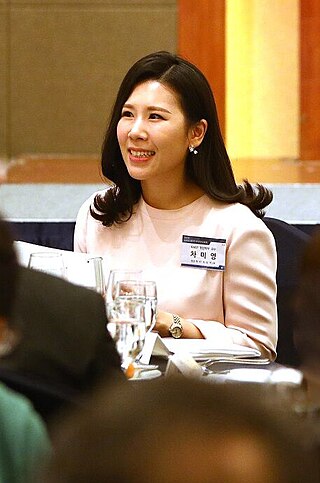
Cha Meeyoung,sometimes known as Mia,is an associate professor at KAIST in the School of Computing and a chief investigator in the Pioneer Research Center for Mathematical and Computational Sciences at the Institute for Basic Science. Her research focuses on network and data science with an emphasis on modeling,analyzing complex information propagation processes,machine learning-based computational social science,and deep learning. In June 2024,she will become the scientific director of the Max Planck Institute for Security and Privacy. She has served on the editorial boards of the journals PeerJ and ACM Transactions on Social Computing.
Kuk Young is a South Korean physicist,former physics professor and vice-provost of research of Seoul National University,distinguished professor of Ewha Womans University,and chairman of the Samsung Science and Technology Foundation. He is a fellow of the American Physical Society,Korean Academy of Science and Technology,Institute of Physics,Korean Physical Society,and Korean Vacuum Society. He has performed editor roles for the journals Nanotechnology,ACS Nano,and Solid State Electronics and is the fourth president of Daegu Gyeongbuk Institute of Science and Technology (DGIST).

Choi Kiwoon is a theoretical particle physicist researching focusing on particle theory and cosmology. He was a research professor at Chonbuk National University and a full professor at KAIST. He is the founding director of the Institute for Basic Science Center for Theoretical Physics of the Universe. He is a member of the Korean Academy of Science and Technology.
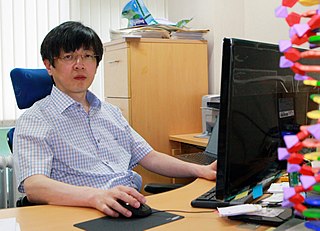
Kim Jin-Soo is a chemist,biologist,and entrepreneur. He was CEO and CSO,ToolGen,Inc.,is a professor in the Department of Chemistry of Seoul National University and director of the Center for Genome Engineering. His research team has developed and improved several types of programmable nucleases,specifically zinc finger nucleases (ZFNs),TAL effector nucleases (TALENs),and RNA-guided engineered nucleases (RGENs). In 2018,he was a Clarivate Analytics Highly Cited Researcher in the cross-field category and in the biology and biochemistry category in 2019.

Oum Sang-il is a Korean mathematician working in graph theory and discrete mathematics. He is a tenured professor in the Department of Mathematical Sciences at KAIST and the chief investigator of the Discrete Mathematics Group in the Pioneer Research Center for Mathematical and Computational Sciences at the Institute for Basic Science. He is known for his work on structural graph theory and in particular for structures and algorithms relating to rank-width,clique-width,and branch-width. He published more than 45 journal papers.

Roe Jung-hye is a South Korean professor of Molecular biology at Seoul National University served as the 6th President of National Research Foundation of Korea - the first woman to lead the Foundation or its preceding foundations from 2018 to 2021.
The Young Scientist Award is a Korean award for young scientists under the age of 40 with research and development achievements in the natural sciences and engineering fields. Four recipients are selected on an annual basis. While the award is organized by the Korean Academy of Science and Technology,it is given on behalf of the president of Korea and comes with prize money of initially KRW 30 million and later KRW 50 million. Candidates for the award must be Korean or working within Korea at a university or research institute. The award is presented to natural science researchers in even-numbered years and engineering in odd-numbered years.
The KFA Awards is an annual award ceremony hosted by Korea Football Association (KFA).
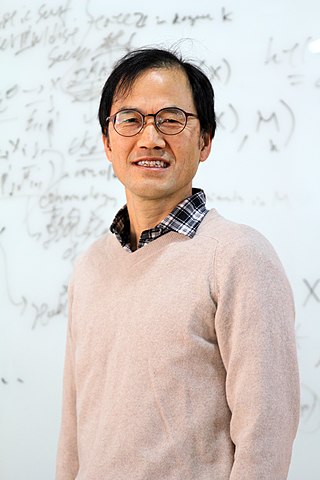
Oh Yong-Geun is a mathematician and distinguished professor at the Pohang University of Science and Technology and founding director of the IBS Center for Geometry and Physics located on that campus. His fields of study have been on symplectic topology,Floer homology,Hamiltonian mechanics,and mirror symmetry He was in the inaugural class of fellows of the American Mathematical Society and has been a member of Institute for Advanced Study,Korean Mathematical Society,and National Academy of Sciences of the Republic of Korea and is on the editorial boards of Journal of Gokova Geometry and Topology and Journal of Mathematics of Kyoto University.
The Korea Engineering Award is an award presented to South Koreans and Korean engineers working in domestic universities or research positions. It is currently jointly presented by the Ministry of Science and ICT and the National Research Foundation of Korea. Research achievements are limited to that of a single project conducted in Korea. Potential recipients go through a several stage review which includes consolation with foreign scholars. It is given annually to up to four individuals and is presented with the Korea Science Award. Prize money of KRW 30 million is given in addition to the award.
Top Scientist and Technologist Award of Korea (Korean: 대한민국최고과학기술인상) is one of two annual awards given in South Korea by the Korean Federation of Science and Technology Societies with the other being a government award for contribution to science and technology promotion. The Top Scientist and Technologist Award of Korea was started in 2003 as the successor to the Science and Technology Award of Korea which was established in 1968. The award is to foster honor and pride and create an environment in which people can focus on research and development by discovering and encouraging scientists and engineers with outstanding achievements who can represent South Korea. While previously given to multiple individuals,from 2003 only person is selected for each cycle. Laureates receive the award and 300 million KRW cash prize.
POSCO TJ Park Prize is an annual award presented by the POSCO TJ Park Foundation in four categories;science,education,community development and philanthropy,and technology. The science prize is given to Korean scientists in natural science or engineering. The education prize,community development and philanthropy prize,and technology prize are given to an individual and/or an organization. Only the community development and philanthropy prize is not retricted by nationality. Recommendations are received from June to September,cadidates are screened from October to December,the winners are announced in January and the prize presentation ceremony happens in April.
The Donghun Award is an annual award presented by the Korean Society for Biochemistry and Molecular Biology awarded to members who made creative research achievements in biochemistry and applied fields. The award was established in accordance with the wishes of Park Ki-Eok and first presented in 1998. Winners are selection by the Constitutional Committee and approval by the board of directors and is notified in April or May with the award ceremony taking place in May.
The Woman Scientist/Engineer of the Year Award is an award presented to female South Koreans and Korean engineers to promote leadership of women in STEM fields. Each year three winners are selected,one in each category,and laureates are given KRW 10 million which is provided by the Ministry of Science and ICT.
References
- ↑ 이, 길신 (26 July 2019). "관심사업 체크우수과학자포상 [교육·인력양성사업 > 우수과학자포상]". National Research Foundation of Korea (in Korean). Retrieved 23 December 2019.
- ↑ "Yeom Han Woong Wins 2015 Korea Science Award". Asian Scientist Newsroom. 5 January 2016. Retrieved 23 December 2019.
- ↑ 저, 작권 (9 February 2004). "노태원 교수등 3명 '한국과학상': 10일 청와대서 시상식". The Science Times (in Korean). Retrieved 23 December 2019.
- ↑ "2011년도『한국과학상』및『젊은과학자상』수상자 선정". Biotech Information Portal (in Korean). 16 December 2011. Retrieved 24 November 2023.
- ↑ 김미연 (18 December 2013). "2013년 한국과학상·젊은 과학자상 수상자 선정". Maeil Business Newspaper (in Korean). Retrieved 24 November 2023.
- ↑ "미래부, 2015년 우수과학자포상 통합 시상식 개최". BRIC (in Korean). 22 December 2015. Retrieved 24 November 2023.
- ↑ 오가희 (26 December 2016). "올해의 과학자는... 박제근 서울대 교수, 임대식 한국과학기술원 교수 한국과학상 수상". Donga Science (in Korean). Retrieved 24 November 2023.
- ↑ "한국과학상에 하승열 석상일 이인규 차형준 교수 각각 수상". Nobel Science (in Korean). 21 December 2017. Retrieved 24 November 2023.
- ↑ 임동식 (20 December 2017). "석상일 UNIST 교수, '2017 한국과학상' 수상". 전자신문 (in Korean). Retrieved 24 November 2023.
- ↑ 이주영 (13 December 2018). "한국과학상에 이탁희·이영숙, 한국공학상에 심태보·최원용". Yonhap News Agency (in Korean). Retrieved 24 November 2023.
- ↑ 최상국 (12 December 2019). "2019 한국과학상 오용근·안지훈, 공학상 이승재·하헌필". 아이뉴스24 (in Korean). Retrieved 24 November 2023.
- ↑ "2020년 한국과학상, 한국공학상, 젊은과학자상 수상자 선정". The Science Monitor (in Korean). 10 December 2010. Retrieved 24 November 2023.
- ↑ "2021 과기대전 개최…한국과학상에 '소아마비 극복' 김인강 교수(종합): 김윤호 교수와 함께 수상…이태억·이태우 교수 한국공학상". The Science Times (in Korean). 23 December 2021. Retrieved 24 November 2023.
- ↑ "한국과학상에 정현식·김종승, 한국공학상에 오준호·민병권". ChosunBiz (in Korean). The Chosun Ilbo . Retrieved 24 November 2023.
- ↑ "김종승 교수 2022년 제22회 한국과학상(대통령상) 수상". Chemistry Department (in Korean). KAIST. 16 December 2022. Retrieved 24 November 2023.
- ↑ William I. Suh (9 November 2023). "Director C Justin LEE and Associate Director KIM Chang Young Receive the '2023 Korean Science Award'". Institute for Basic Science . Retrieved 24 November 2023.